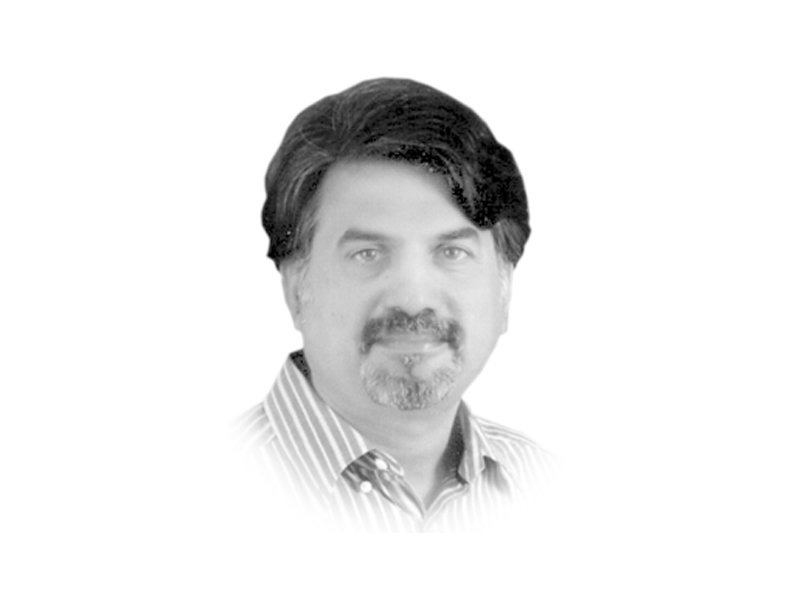
A planted proponent (Pakistan’s Ambassador to the US — 2008-11) and great exponent of civilian leadership sanctioned (‘I am going to help clean up the ISI’ was what President Asif Ali Zardari told Joe Biden the vice-president-elect of the United States when he came on a one-day visit to Pakistan days before Obama took over as US president: Bob Woodward’s Obama’s Wars-2010) coercive diplomacy executed (from United States) in response to an (enemy endearing hypothesis) action (Pakistan military supports militants and utilises terrorism as an instrument of national interest) presumably being undertaken for many decades by our own military. Mr Haqqani had already written in detail about the ‘Pakistan military and ISI’s entanglement with Islamic extremism’ in his 2005 published book Pakistan-Between Mosque and Military. But when Joe Biden (leading a US congressional delegation, Jan 9, 2009) was telling President Zardari that ‘we cannot fix Afghanistan without your help — the military in Pakistan had little idea about what President Zardari meant when he replied ‘I can’t fix Pakistan without your help’. For United States ‘President Zardari guided and controlled foreseeable Pakistan fixing’ Joe Biden was also most graciously awarded Hilal-i-Imtiaz, the second highest civilian award of Pakistan.
Prior to this meeting, President Zardari had already indicated to the Americans the kind of government that he was likely to head in Pakistan — on Nov 12, 2008 the CIA Director, Mike Hayden, had gone to New York City to meet the visiting Pakistani president and discuss Predator drones strikes inside Pakistan, President Zardari is quoted (Obama’s Wars) to have said, “Collateral damage worries you Americans it does not worry me”. This, Mike Hayden says, gave CIA an important greenlight as far as drone strikes in Pakistan were concerned. Can we for a moment imagine PM Modi of India visiting the United States immediately after his election and giving a one-on-one audience to the CIA director? Prime Minister Modi of India despite harbouring ‘anti-Pakistani grudges’ is a political man who is anti-Pakistani to the core but very ‘Indianised’- what have the men that we have been putting in political offices doing except trying to change (their preferred and their fancied) strategic direction of the country and putting new spins on the politics of the country? (and help CIA expand network of spies in Pakistan as the article suggests). It is maybe for such holders of political offices that America’s (arguably) greatest diplomat and political scientist Henry Kissinger wrote, ‘When presidents become negotiators no escape routes are left… concessions are irrevocable without dishonor’ (H Kissinger, The White House Years — 2011).
The military intelligence can go wrong, so can operational intelligence but do we have the political intelligence to set right such wrongs? The military also makes mistakes (Kargil 1971) and the holder of political offices at that time (General (retd) Pervez Musharraf and General Yahya Khan) are accused by the civilian leadership of ‘hiding behind their uniforms’ but my question to the civilian leadership is — why can’t they also hide behind their own national flag?
Mr Haqqani writes in his article, ‘Ambassadors do not make policy; they only facilitate understanding between countries that leads to policy making in their respective capitals.’ But I ask what kind of diplomacy associates itself with behind the-scenes-scheming, duplicity and double dealing (even when authorised by the civilian leadership) against your own state? Which ambassador he can name that indulges in such ambassadorial acts that are tantamount to betraying your own country? What policy making does a diplomat help engineer when he becomes part of a ‘crooked anti-state plot’ of facilitating the positioning of foreign spies in his own country? Diplomacy — the modern concept of it emphasises more on openness, bilateral and multilateral agreements and above all led and directed by the unquestionable conduct of a diplomat who is nationalist to the core (doesn’t compromise on national interests).
The more balanced view on Pakistan’s national security by Mr Haqqani is expressed not in The Washington Post article but his book Magnificent Delusions — Pakistan, The United States and the epic history of misunderstanding wherein he writes, ‘although the army and ISI had made it difficult to alter Pakistan’s national security policies, civilian leaders’ incompetence and lack of perception had also impeded their success, as had their reputation for corruption’.
The civilian leadership of Pakistan released the Hamoodur Rehman Commission report only after it was leaked by the Indian media (2000). Other commission reports, including the Abbottabad Commission report, the one-judge judicial commission report on the Model Town tragedy, the Memogate Commission report and the Dawn Leaks commission report are all victims of ‘back and forth and drag on’ political strategies of the governments in Pakistan — to top this all ‘Panama Leaks’ stands out as the dragon among the ‘devils of delays and drag on’ strategies that the governments in Pakistan practise and execute. And guess what the poor people of Pakistan that vote such political elites to the political offices and the corridors of power can do nothing about it? Come next elections they would again stand in line to vote without once thinking ‘are they not replacing one political crook with another’?
Lastly, The Lion King (1994) was a wonderful animated movie that most of us have had the privilege of watching. Mufasa died only because his evil brother Scar betrayed him. It’s not the betrayal that I remember most — it’s the cry of help that Simba raises as his father lies dying — ‘help — somebody , anybody’.
Published in The Express Tribune, March 28th, 2017.
Like Opinion & Editorial on Facebook, follow @ETOpEd on Twitter to receive all updates on all our daily pieces.












COMMENTS (3)
Comments are moderated and generally will be posted if they are on-topic and not abusive.
For more information, please see our Comments FAQ